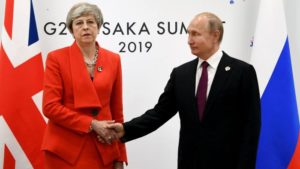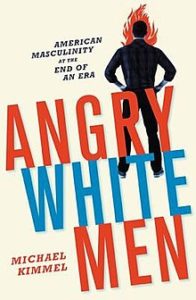 “Don’t interfere in our election.” That sentence could be expressed in a variety of ways, as a serious insistence, a cautionary warning, or a mild plea. The tone/volume of voice, and intonation are likely to be telling, as well as the facial expression and body language. President Trump today at the G20 Conference used that sentence in a unique way, in addressing President Putin of Russia and his staff. It was clearly expressed as a joke, as Trump waggled his finger at Putin while smiling, as Putin smiled as well. The meaning was clear: The words spoken were not to be taken seriously, as Trump does not believe Russia interfered in the 2016 US election, or at least he does not want to admit that may have happened, as it calls into question the legitimacy of his presidency (as Jimmy Carter claimed today). The lack of concern on the part of the US President clashes with the consensus of his own intelligence agencies, which have clearly stated that Russia did in fact interfere.
“Don’t interfere in our election.” That sentence could be expressed in a variety of ways, as a serious insistence, a cautionary warning, or a mild plea. The tone/volume of voice, and intonation are likely to be telling, as well as the facial expression and body language. President Trump today at the G20 Conference used that sentence in a unique way, in addressing President Putin of Russia and his staff. It was clearly expressed as a joke, as Trump waggled his finger at Putin while smiling, as Putin smiled as well. The meaning was clear: The words spoken were not to be taken seriously, as Trump does not believe Russia interfered in the 2016 US election, or at least he does not want to admit that may have happened, as it calls into question the legitimacy of his presidency (as Jimmy Carter claimed today). The lack of concern on the part of the US President clashes with the consensus of his own intelligence agencies, which have clearly stated that Russia did in fact interfere.

Trump’s demeanor and behavior offered a dramatic contrast to that of Prime Minister May of the UK, who was stone-faced in her obligatory handshake with Putin, after describing Russia’s behavior in poisoning a Russian dissident in England as “despicable”.
Month: June 2019
Angry White Men
 I was recently at a conference at the University of Oregon and while waiting to give my presentation at the Student Center there, I walked around and noticed a “Men’s Center” located on the same floor. The existence of a student organization dedicated to men was in itself surprising to me – it seemed to me the only thing more superfluous than a “men’s center” (which after all equates to US society as a whole) would be a “white, heterosexual men’s center”. Surprising to me as well were the posters and messages on the door and outside the walls of the Men’s Center, which voiced support for all kinds of marginalized, disadvantaged, or traumatized groups: Native Americans, LGBTQ+, the disabled community, African-Americans, non-gender-binary individuals, and rape victims. Nothing in support of men’s rights.
I was recently at a conference at the University of Oregon and while waiting to give my presentation at the Student Center there, I walked around and noticed a “Men’s Center” located on the same floor. The existence of a student organization dedicated to men was in itself surprising to me – it seemed to me the only thing more superfluous than a “men’s center” (which after all equates to US society as a whole) would be a “white, heterosexual men’s center”. Surprising to me as well were the posters and messages on the door and outside the walls of the Men’s Center, which voiced support for all kinds of marginalized, disadvantaged, or traumatized groups: Native Americans, LGBTQ+, the disabled community, African-Americans, non-gender-binary individuals, and rape victims. Nothing in support of men’s rights.
It turns out that this Center was established in 2002, according to the university website, to address issues of male behavior in general in the US, and specifically at the University of Oregon (UO):
The development of the Center occurred in response to concerns raised by UO staff, faculty and students about men on campus…nationally, college-aged men were having serious problems: committing over 70% of the major conduct violations, engaging in sexism, sexual assault, and other bias incidences. Additionally, men are responsible for the overwhelming majority of shootings that have occurred on college and high school campuses nationwide…UO staff, faculty and students recognized that UO men were in crisis and wanted to take action. These pioneers decided to open the UOMC, the first center of its kind in the USA.
The mission of the Center, according to their website, is to fight “toxic masculinity”, defined as “the current configuration of practice that legitimizes men’s dominant position in society and justifies the subordination of women”. So the Center is not at all about supporting “angry white men” upset at the prospect of losing their dominant place in US society. The book by Michael Kimmel, Angry White Men: American Masculinity at the End of an Era, documents that perspective through interviews with men from around the US. Kimmel introduces the idea of aggrieved entitlement in the book, namely that for white men social equality means not equality, but a loss of social position. They are aggrieved because they expect life to be the same as it was for their fathers or grandfathers. The book was published in 2013 and republished recently, as the election of Donald Trump has shown that those grievances have been widespread enough in the US to lead to the election of someone who rejects social equality and the declining role of white males in US society. The slogan of “taking back our country” represents well this idea of going back to a time when white males had undisputed primacy in society.
Kimmel has a new book, Healing From Hate: How Young Men Get Into And Out Of Violent Extremism, in which he looks at how aggrieved white males have become neo-nazis, extreme right-wing skinheads, or adherents to the Alt-Right in the US, Sweden, and Germany. He documents in the book stories of men growing up isolated or abused and who turn to right-wing extremism for social acceptance. The book also shows that such men can go in different, healthier directions if they can find fulfilling relationships with women or within other groups. In fact, small numbers of men who have not had successful relationships with women have turned to aggrieved violence. These are the so-called Incels, short for “involuntary celibates,” a largely online group who have been in the news in recent years through violent attacks as retaliation against women. It may be that a group such as available through the University of Oregon’s Men’s Center, which sponsors weekly discussion groups, can be helpful in showing young white men another avenue towards social acceptance and group solidarity.